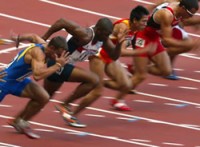Caffeine has always been recognized as an agent that stimulates the release of energy in the body. Among the Aztecs, the energy-giving power of cacao was so jealously prized that, apart from the nobility, only soldiers on campaign and the pochta, a hereditary class of merchant-adventurers, were permitted to use it. (Montezuma I even promulgated a law that no one who had not participated in armed conflict, not even the king’s son, could enjoy the privilege of consuming it.) Similarly, American soldiers in World War II carried ration packs that included caffeine pills to keep them going strong in combat. And for many years, athletes, including especially weight lifters and long distance runners, swimmers, and cyclists, have relied on caffeine’s energy giving powers to boost their performance in training and competition.

In confirmation of this massive field experience, scientists have, in the last few decades, demonstrated caffeine’s benefits to muscle activity, physical training, competitive sports events, endurance and, more recently, short term physical activity as well. Despite extensive research, however, the landscape of studies has been bedeviled by some ambiguous and apparently contradictory findings, confusions resulting largely from mistaken notions about the mechanisms that underlie caffeine’s ergogenic, or energy producing, effects—and, as it turns out, by some surprising differences between the effects of coffee and caffeine pills.
Fortunately, in 2001, T. E. Graham, Ph. D., professor in the School of Human Biology and Nutritional Sciences, University of Guelph, Ontario, a leading sports researcher and sports physiologist, published an ambitious metastudy in Sports Medicine on caffeine and exercise,“Caffeine and Exercise: Metabolism, Endurance, and Performance” (2001, 31(11):785-807). In this study, Graham gathers the latest results from the best research worldwide in order to finally answer many of the longstanding questions about the ergogenic benefits of caffeine.
After exhaustively examining what is currently known about caffeine and exercise, Graham concludes that caffeine improves performance in most if not all sports activities and has no detrimental side effects on athletes. Based on his review of work undertaken by dozens of scientists, Graham states that caffeine is a “powerful ergogenic aid,” which means it boosts the output of energy by the body, at blood levels markedly below the permissible limit of the International Olympic Committee (I.O.C.), and that it is beneficial in both training and competition.
Caffeine enables the athlete to train at a greater power output, with greater speed and for a longer time. It has also been proven to increase power, speed, and endurance in simulated and actual race conditions. Although old theories held that caffeine benefited only endurance athletics, we know now that caffeine’s beneficial effects are operative in activities that last as little as 60 seconds or as long as several hours. And, although it is still not clear if it can improve maximal strength, caffeine makes a valuable contribution to strength training and performance by imparting enhanced endurance or resistance to fatigue and also by relieving pain. Caffeine is also a powerful antioxidant—much stronger than vitamin C—and can help combat the muscle damage done by increased free radical activity during exercise. There is no evidence that caffeine ingestion before exercise leads to dehydration, ion imbalance, upset stomach, or other adverse effects. Men and women metabolize caffeine in the same way, and, given the same dose of caffeine in proportion to their body weight, will exhibit the same blood levels and concentrations of metabolites, the substances into which caffeine is transformed by the body. Importantly, tolerance to caffeine does not seem to affect its ergogenic, or energy producing, benefits, which means that both non-users and long term users of caffeine will respond to it in same way and to the same degree.




One Response